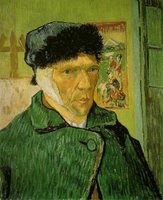Patience and Fr. Bob
I will be graduating this Friday in UP. I love to tell my friends that I would be getting two MA degrees: one for Comparative Literature, the other for Patience. After a series of delays, postponements and last-minute changes within a four-year period I would be getting my diploma. And of course, to those who studied in UP or know UP system, patience is really a virtue that you should always carry with you.
But no, really, I'm a very impatient person. I hate situations wherein I have to wait for more than what I have planned for the day. I easily get annoyed by people who agree meeting me at a certain time but would show up 30 or 45 minutes late. I tend to walk out of conferences or seminars that do not start on time. I complain when movies do not commence on the advertised schedule. When I was a kid that I went home alone after attending Mass in Parañaque when my elder sister did not show up after ten minutes of appointed time and place. I had to walk some eight kilometers back home only to find that my sister was not home either. So I had to walk back to the church. I was five years old at that time and had to cross Bicutan interchange twice!
Long queues at ATM's, flight delays, bus drivers and conductors who take their sweet time at stop-overs, waiters who make me wait interminably really get me fuming mad. I am a very impatient person. But last week I was given a crash course on the value of waiting and being patient. I just came from Mall of Asia with my brother and his kids. I chanced upon Fr. Bob Hogan seated like a toddler on the stairs of Loyola House of Studies lobby. His hands were on the rail of the ramp for wheel-chair bound persons. His eyes, straight, focused on the driveway. He was obviously waiting for someone. I approached him and asked matter-of-factly,
"Father, are you okay?" To which he replied softly, "I sure am." Then I asked him the obvious, "You're waiting for someone to pick you up?"
"Yes, I am."
"How long have you been waiting here?"
"Well, she said she's going to pick me up at around 7:00." I looked at my watch and told him,
"But it's already 8:45, Father. Do you think she's still coming?"
"I'm not sure."
'But you're still going to wait."
"For a few more minutes."
"Really, you are that patient?"
"Well," he said without any hint of bragging, "I just spent an hour with a lady who had been lying sick in bed for 7 years. I think I can wait for a little more."
"That's incredible, I wish I had even half of your patience." To which he merely shrugged his shoulders as if saying, that's how my life's been, one of patient waiting.
I went to my room and promptly forgot about the incident. At 10 pm I called the porter and asked whether someone did pick Fr. Hogan up. The porter said no, nobody came. I asked when did Fr. Hogan leave his place, the porter replied, about past nine. I even forgot to ask the old man if he had eaten before his long wait with someone who never showed up.
Patience. I realize how easy it is for me to dismiss people who do not meet my expectations, who do not show up on time at the exact appointed place and hour. It's easy to label them as insensitive and chronic late-comers. Easier even to say that MY TIME is more important than theirs. Yet this one old Father showed me much more than I can learn from self-help books and recollections: that patient waiting is a divine act. Divine because it allows people to commit mistakes without judging them. It enables those who wait patiently to exercise their freedom, their generosity and understanding to be in the position of those who are being waited. Patience recognizes the need to let go of our desire to control many things including those that are really beyond our control.
And finally, patience recognizes too that in one time or another, people have been patient with me when I needed it most.



